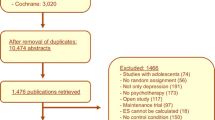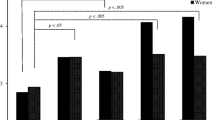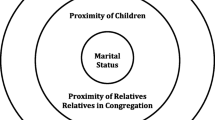Abstract
This study assessed the relationships between older patients’ social support resources and depressive symptoms and psychosocial functioning at 6 months following a psychiatric hospital discharge. The data used in this study were extracted from a prospective study titled “Service Use of Depressed Elders after Acute Care” (National Institute of Mental Health-56208). This sample included 148 older patients who participated in the initial and the 6-month follow-up assessment. Ordinary Least Squares regression (OLS) was used to examine important social support resources in relation to older patients’ depressive symptoms and psychosocial functioning. A vast majority of patients were embedded in a social support network that consisted of acquaintances and confidants. Patients’ depressive symptoms were related to availability of a confidant and the extent to which they spent time with others. However, patients’ psychosocial functioning was not related to social support resources assessed in this study.
Similar content being viewed by others
References
Alexopoulos, G. S., Meyers, B. S., Young, R. C., Kakuma, T., Feder, M., Einhorn, A., et al. (1996). Recovery in geriatric depression. Archives of General Psychiatry, 53, 305–312.
Allison, P. (2002). Missing data. Thousand Oaks, CA: SAGE.
American Psychiatric Association. (2000). Practice guideline for the treatment of patients with major depressive disorder.
Blazer, D. G. (2003). Depression in late life: Review and commentary. Journal of Gerontology, 58A, 249–265.
Bosworth, H. B., Hays, J. C., George, L. K., & Steffens, D. C. (2002). Psychosocial and clincial predictors of uniploar depression outcome in older adults. International Journal of Geriatric Psychiatry, 17, 238–246.
Brown, S. L. (2001). Variations in utilization and cost of inpatient psychiatric services among adults in Maryland. Psychiatric Services, 52, 841–843.
Cole, M. (2001). The impact of geriatric post-discharge services on mental state. Age and Ageing, 30, 415–418.
Colenda, C., Mickus, M., Marcus, S., Tanielian, T., & Pincus, H. (2002). Comparison of adult and geriatric psychiatric practice patterns: Findings from the American Psychiatric Association’s Practice Research Network. American Journal of Geriatric Psychiatry, 10, 609–617.
Ezquiaga, E., Garcia, A., Bravo, M., & Pallares, T. (1998). Factors associated with outcome in major depression: A 6-month prospective study. Social Psychiatry Psychiatric Epidemiology, 33, 552–557.
Ezquiaga, E., Garcia-Lopez, A., de Dios, C., Leiva, A., Bravo, M., & Montejo, J. (2004). Clinical and psychosocial factors associated with the outcome of unipolar major depression: A one year prospective study. Journal of Affective Disorders, 79, 63–70.
Fillenbaum, G. (1988). Multidimensional functional assessment of older adult: The Duke older Americans resources and services procedures. Hillsdale, NJ: Erlbaum.
Fillenbaum, G., & Smyer, M. A. (1981). The development, validity, and reliability of the OARS Multidimensional functional assessment questionnaire. Journal of Gerontology, 36(4), 428–434.
Hall, R. C. (1995). Global assessment of functioning: A modified scale. Psychosomatic, 36(3), 267–275.
Hinrichsen, G. A., & Hernandez, N. A. (1993). Factors associated with recovery from and relapse into major depressive disorder in the elderly. American Journal of Psychiatry, 150(12), 1820–1825.
Hudon, C., Fortin, M., & Vanasse, A. (2005). Cumulative illness rating scale was reliable and valid index in a family practice context. Journal of Clinical Epidemiology, 58, 603–608.
Hughes, D., Blazer, D., & George, L. (1988). Age difference in life events: A multivariate controlled analysis. International Journal of Aging and Human Development, 27, 207–220.
Jones, S., Thornicroft, G., Dunn, G., & Coffey, M. (1995). A brief mental health outcome scale, Reliability and validity of the Global Assessment of Functioning (GAF). British Journal of Psychiatry, 166, 654–659.
Kraaij, V., Arensman, E., & Spinboven, P. (2002). Negative life events and depression in elderly persons: A meta-analysis. Journal of Gerontology, 57B, P87–P94.
Langa, K., Valenstein, M., Fendrick, A., Kabeto, M., & Vijan, S. (2004). Extent and cost of informal caregiving for older Americans with symptoms of depression. American Journal of Psychiatry, 161, 857–863.
Lenze, E. J., Miller, M. D., Dew, M. A., Martire, L. M., Mulsant, B. H., Begley, A. E., et al. (2001). Subjective health measures and acute treatment outcomes in geriatric depression. International Journal of Geriatric Psychiatry, 16, 1149–1155.
Li, H., Morrow-Howell, N., & Proctor, E. (2005). Outpatient mental health service use by older adults after acute psychiatric hospitalization. Journal of Behavioral Health Services & Research, 32, 74–85.
Lin, N., Ye, X., & Ensel, W. (1999). Social support and depressed mood: A structural analysis. Journal of Health and Social Behavior, 40, 344–359.
Lynch, T., Mendelson, T., Robins, C., Ranga, K., Krishnan, R., George, L., et al. (1999). Journal of Affective Disorders, 55, 159–170.
Miller, M., Paradis, C., Houck, P., Mazumdar, S., Stackl, J., Rifai, H., et al. (1991). Rating chronic medical illness burden in geropsychiatric practice and research: Application of the Cumulative Illness Rating Scale. Psychiatry Research, 41, 237–248.
Moos, R., Nichol, A., & Moos, B. (2002). Global assessment of functioning ratings and the allocation and outcomes of mental health services. Psychiatric Services, 53, 703–737.
Morrow-Howell, N., & Proctor, E. (1996). Informal caregiving to older adults hospitalized for depression. Aging and Mental Health, 2, 222–231.
Morrow-Howell, N., Proctor, E., Blinne, W., Rubin, E., Saunders, J., & Rozario, P. (2006). Post-acute dispositions of older adults hospitalized for depression. Aging and Mental Health, 10, 352–361.
Office of Management and Budget (OMB). (2000). Standards for defining metropolitan and micropolitan statistical Areas. Federal Register, 65, 82228–82238.
Paykel, E., Cooper, Z., Ramana, R., & Hayhurst, H. (1996). Life events, social support and martial relationships in the outcome of severe depression. Psychological Medicine, 26, 121–133.
Phelan, M., Wykes, T., & Goldman, H. (1994). Global function scales. Social Psychiatry and Psychiatric Epidemiology, 29, 205–211.
Ramana, R., Paykel, E., Melzer, D., Mehta, M., & Surtees, P. (2003). Aftercare of depressed inpatients: Service delivery and unmet needs. Social Psychiatry Psychiatric Epidemiology, 38, 109–115.
Serby, M., & Yu, M. (2003). Overview: Depression in the elderly. Mount Sinai Journal of Medicine, 70, 38–44.
Thoits, P. (1995). Stress, coping, and social support processes: Where are we? What next? Journal of Health and Social Behavior, Extra Issue, 53–79.
Vythilingam, M., Chen, J., Bremner, D., Mazure, C., Maciejewski, P., & Nelson, D. (2003). Psychotic depression and mortality. American Journal of Psychiatry, 160, 574–576.
Woo, B., Golshan, S., Allen, E., Daly, J., Jeste, D., & Sewell, D. (2006). Factors associated with frequent admissions to an acute geriatric psychiatric inpatient unit. Journal of Geriatric Psychiatry Neurology, 19, 226–230.
Yesavage, J. A., Brink, T. L., Rose, T. L., & Lum, O. (1983). Development and validation of a geriatric depression screening scale: A preliminary report. Journal of Psychiatric Research, 17, 37–49.
Zubenko, G. S., Mulsant, B. H., Rifai, A. H., Sweet, R. A., Pasternak, R. E., Marino, L. J., et al. (1994). Impact of acute psychiatric inpatient treatment on major depression in late life and prediction of response. American Journal of Psychiatry, 151(7), 987–994.
Author information
Authors and Affiliations
Corresponding author
Rights and permissions
About this article
Cite this article
Li, H., Morrow-Howell, N., Proctor, E. et al. Social Support Resources and Post-Acute Recovery for Older Adults with Major Depression. Community Ment Health J 49, 419–426 (2013). https://doi.org/10.1007/s10597-012-9567-1
Received:
Accepted:
Published:
Issue Date:
DOI: https://doi.org/10.1007/s10597-012-9567-1




